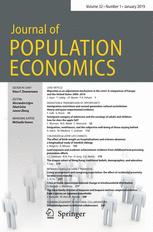Unemployment reduces the life satisfaction of the partner! However, while wives’ life satisfaction does not recover even two years after their partners becoming unemployed, husbands only react to their wives’ joblessness during the first year of unemployment.
Read more in:
Milena Nikolova & Sinem H. Ayhan: Your spouse is fired! How much do you care?
Journal of Population Economics, Vol. 32 (2019), Issue 3, pp. 799-844.
Journal Website. Download PDF of article for free – OPEN ACCESS
GLO Fellows Milena Nikolova and Sinem H. Ayhan
Author Abstract: This study is the first to provide a causal estimate of the cross-spouse subjective well-being consequences of unemployment. Using German panel data on married and cohabiting partners for 1991–2015 and information on exogenous unemployment entry due to workplace closure, we show that one spouse’s unemployment experience reduces the life satisfaction of the other partner. The estimated spillover is at least one quarter of the effect of own unemployment and is equally pronounced among female and male partners. In addition, while wives’ life satisfaction does not recover even two years after their partners becoming unemployed, husbands only react to their wives’ joblessness during the first year of unemployment. Our results are insensitive to income controls and the couple’s position in the income distribution, thus reflecting the non-pecuniary costs of unemployment. Although the income loss hardly explains the negative spillover effects of unemployment on spousal life satisfaction, we document large declines in spousal satisfaction with household income and living standards. This finding supports the argument that the costs of unemployment borne by indirectly affected spouses extend beyond the loss of consumption opportunities and might be rather related to social values attached to market work. Being robust to a battery of sensitivity checks, our findings imply that public policy programs aimed at mitigating unemployment’s negative consequences need to target not only those directly affected but also cohabiting spouses.

Ends;
